TODAY CQN brings you the fifteenth EXCLUSIVE extract from Alex Gordon’s book, ‘CELTIC: The Awakening’, which was published by Mainstream in 2013.
The book covers the most amazing decade in the club’s history, the Sixties, an extraordinary period when the team were transformed from east end misfits to European masters.
IN the spring of 1968, Celtic took their players for a swift trip to North America where, ironically, they faced AC Milan on 26 May, a year and a day after they had defeated their city rivals Inter to conquer Europe. There had been a power shift in the city and AC Milan were the new champions of Italy.
The day before the game Celtic celebrated the anniversary of their historic triumph with a beach barbeque in Miami, where they had spent the previous six days in recuperation following an exhausting season. However, it was down to business twenty-four hours later with a game at the Roosevelt Stadium, in New Jersey, with a healthy crowd of 25,000 turning out.
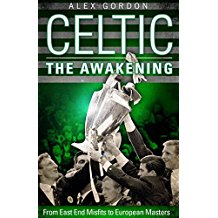
‘We have had a great time in Miami and it was essential to get a break, but football is our business,’ said Stein. ‘We’ve got two matches here against the champions of Italy and I want to use them as stepping stones to another European Cup triumph. These are the sort of matches you need to find out a few things about your players and yourself.’
Willie Wallace scored in a 1-1 draw and, six days later, Celtic beat AC Milan 2-0 with goals from Bobby Lennox and Charlie Gallagher in Toronto in front of 30,000, a record crowd at the time for Canada. The results would become significant later in the new season.
As they geared up for another tilt at glory, Celtic were drawn against Rangers for the second consecutive year in the 1968/69 League Cup sections. Morton and Partick Thistle made up the four-team group. An Old Firm encounter on a gloriously sunny day on the south side of Glasgow on 10 August welcomed in a new season. Stein was an enormous admirer of the strolling style of George Connelly, an enigmatic Fifer with all the skill in the world.
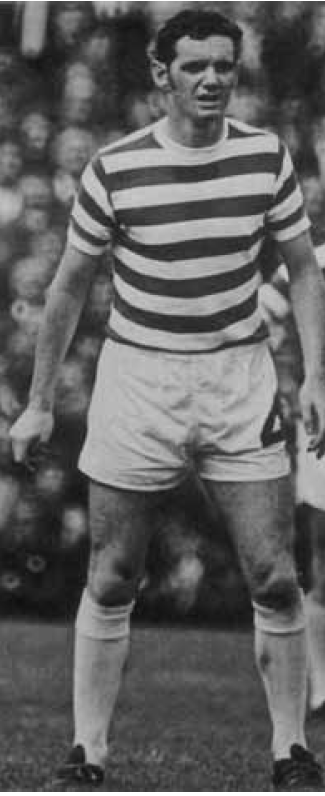
CLASS ACT…the skilful George Connelly.
He had been introduced to the Celtic support during the interval of the Cup-Winners’ Cup-tie against Kiev Dynamo in January 1966. Stein bet the youngster £5 he could not juggle to all four corners of the pitch without letting the ball drop once. Connelly was happy to accept the bet and Stein, a gambling man, must have known he was onto a loser as the boy took off confidently in the direction of the Celtic end, returned to the centre circle, strolled across to The Jungle, back to the centre spot and then off to what was known as the Rangers end, then performed in front of the main stand and came to a halt at the home dug-out.
Not once did the ball touch the ground. Not once did the youngster even look as though he was struggling to display his special talents. The crowd cheered and, later, Stein coughed up when he was reminded of the bet. Clearly, though, the lad was no circus act.
Stein had introduced Connelly’s outstanding range of ball-playing skills on the last day of the season as a substitute against Dunfermline when the title was won. He was prepared now to unleash his potent weapon on football on a more consistent basis. He came in against Rangers, an enormous vote of confidence in the player by his manager, especially with the match at Ibrox. He wore the No.7 shorts with Jimmy Johnstone at No.8, but the ploy was simply mind games by Stein. As soon as the whistle went for the start of the game and the campaign, Connelly gracefully sauntered into the right side of midfield and Johnstone hugged the touchline. More often than not, the more mobile and aggressive Jim Brogan was now playing beside Billy McNeill in the middle of the defence instead of John Clark, a solid, if unspectacular, performer.

Tommy Gemmell still alternated between right and left at the back of the defence and was in at No.2 for the opener with Willie O’Neill, sturdy and dependable, at left-back. Stein went with this line-up: Simpson; Gemmell, McNeill, Brogan and O’Neill; Connelly and Murdoch; Johnstone, Wallace, Lennox and Hughes. Apart from new boy Connelly, it was the usual suspects; tried and trusted professionals who rarely, if ever, disappointed.
Rangers, after the whirlwind of transfer activity in the previous two summers, had been strangely quiet on this front with no major signings. It would only be a matter of months, though, before they shattered the Scottish transfer record. It was the first Old Firm meeting since 2 January at Parkhead, where Davie White had dodged defeat courtesy of two gifts from the unfortunate Fallon. Curiously, White dropped goalkeeper Erik Sorensen with the lanky Norrie Martin taking over. There was talk of Sorensen, back in his native Denmark for a summer break, saying exceptionally kind things about Stein and Celtic in an interview with a local newspaper. True or otherwise, their £30,000 buy from Morton in the summer of 1967 never played again for the Ibrox side and was freed at the end of that campaign.
A honed and lean Willie Wallace got away from the Rangers rearguard twice to gleefully place efforts wide of the helpless Martin and there was no comeback from the Ibrox side as it finished 2-0. There was much for the away support to enthuse over, not the least the elegant performance from Connelly who strode through the game as though he was a veteran of the fixture. Wallace also got the first goal of the new season at Parkhead in midweek as Celtic overcame Morton 4-1 and he was unstoppable as he hit all the goals in the 4-0 hammering of Partick Thistle in the next game. Hardly a surprise, he claimed the only goal of the game against Rangers after putting them to sword in Govan only two weeks earlier.
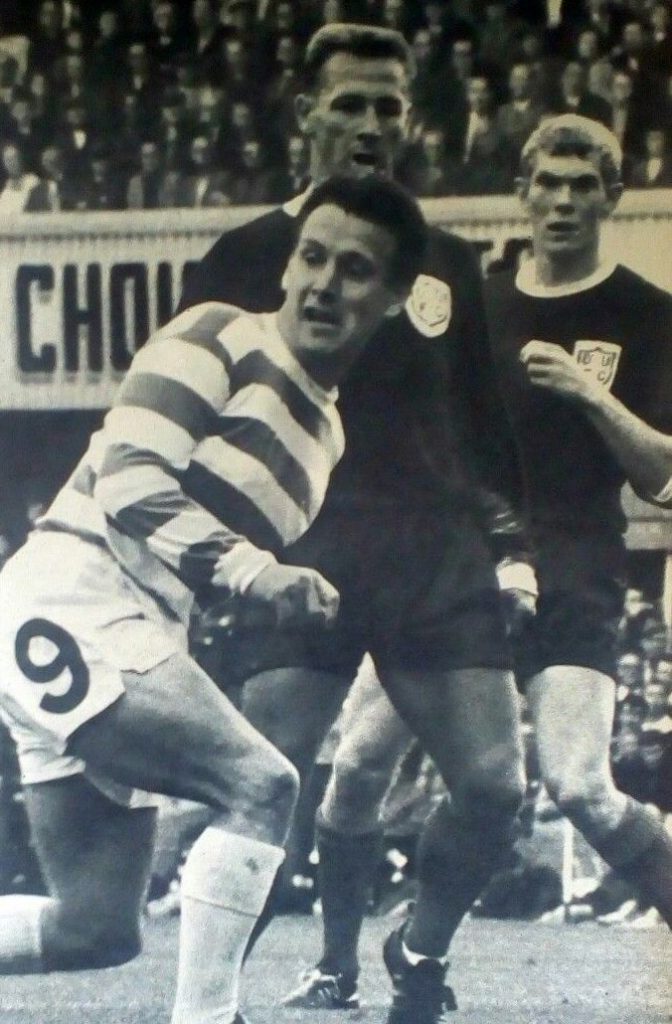
DANGERMAN…Willie Wallace puts pressure on Dundee United duo Jimmy Miller and Mogens Berg.
Incredibly, Wallace, surely the best £30,000 ever spent by Stein, got the ball rolling in their next match, a 3-0 win over Morton at Cappielow. Bobby Lennox was also beginning to set his sights and he lashed in five in the final qualifying tie against Partick Thistle, a 6-1 win at Firhill. Six successive wins with twenty goals scored. Celtic had now gone a phenomenal twenty-one games without defeat since being beaten by Dunfermline in the Scottish Cup in January. That stretched that to twenty-two when the league season got underway at Shawfield where Clyde were trounced 3-0.
Four days after that, Celtic went on an amazing ten-goal spree against Hamilton in the League Cup quarter-final first leg at Parkhead, the goals being shared equally between Lennox and Chalmers. Over four decades later I spoke to both marksmen about this remarkable game. Chalmers said, ‘You have to feel a bit of sympathy for the goalie. He probably made a few good saves, too, with the game being so one-sided.
‘As I recall, we started at 100-miles-per-hour and just got faster as the game wore on. Hamilton didn’t stand a chance and it looked like a race between Bobby and myself to see who could score the most. We had a friendly rivalry and we were both ruthless in front of goal. A lot of teams might have eased up if they had gone four or five goals ahead, but not this Celtic team. Big Jock hammered into us to always entertain the fans and I would like to think we managed that against Accies. It was just one of those nights when everything clicked into place.’

Lennox admitted, ‘I still smile whenever someone mentions that 10-0 game. It gives me a warm glow. As I remember, it was a thoroughly miserable night in Glasgow. The rain was lashing down all the way through the game. In fact, I think it had been chucking it down all day. Mind you, it must have been even more miserable for their goalkeeper, Billy Lamont. No-one wants a scoreline like that on their CV.
‘I agree with Stevie, you’ve got to feel something for the fella. Losing ten goals can’t be much fun for any keeper, but when you are piling on the misery you don’t actually think about your opponent’s feelings. That wouldn’t be too professional. You are there to do a job for your club and that’s the end of it.
‘The fans turn out to see you win and score a few goals and that’s what we achieved that night. I believe I might have scored with the last kick of the ball to level with Stevie. Ten goals and only two scorers? Amazing! I suppose it is also fairly unusual for a player to score five goals in back-to-back games as had happened with me against Partick Thistle and Hamilton. A lot of unusual things happened around that time.’
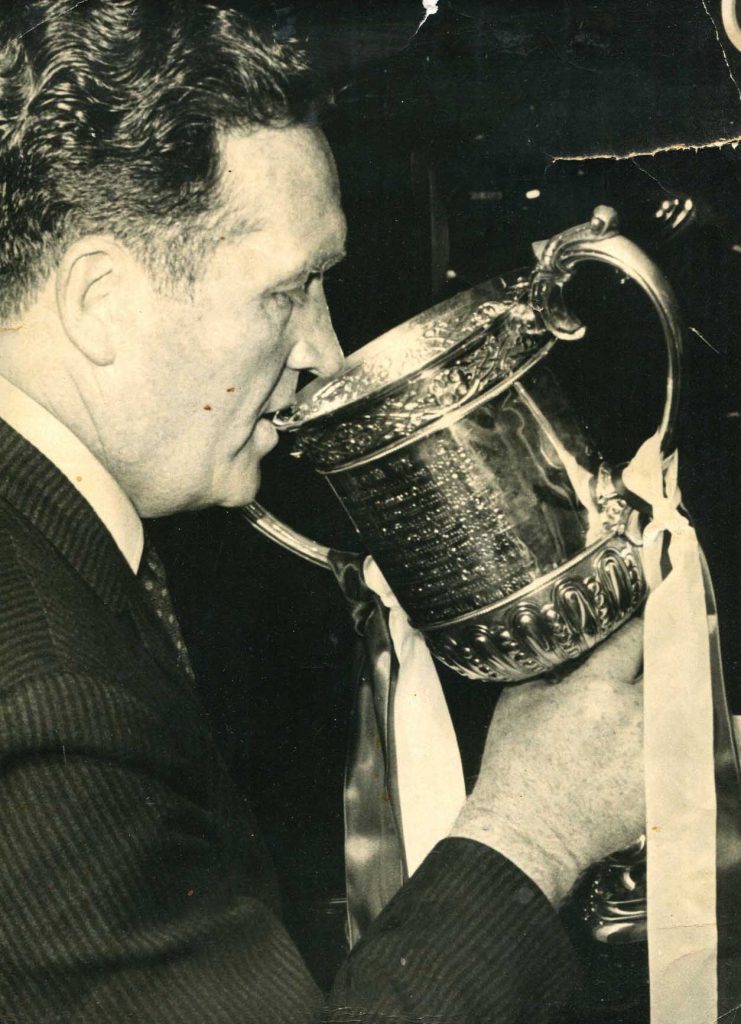
CUP OF DREAMS…Jock Stein with the Scottish Cup.
Incidentally, Lennox has an interesting take on the League Cup. ‘I thought it was a more difficult trophy to win than the Scottish Cup. Maybe not as glamorous, but a lot harder. For a start, back then, you had to play six games in a league format, get through that and then face a two-legged quarter-final and then a semi-final before reaching the final. In the Scottish Cup, you could get lucky and get a few home draws against teams from lower divisions. So, for me, the League Cup was most certainly a competition to be treated with the greatest of respect.’
Did Jock Stein make a fuss of the two goalscorers afterwards? ‘Not a chance,’ answered Chalmers. ‘He never did, not with me, anyway. That was just not his style. He always liked to keep you on edge. I never looked for a pat on the back. I just wanted to do my job and cram as many goals into the opposition’s net as possible. That’s what the Hamilton game was all about. If the match had lasted another ten or fifteen minutes we would still have been chasing goals. Joe McBride played that night, too, so he would have been looking for a few. It’s incredible to note he didn’t score, but he would have made a few, that’s for sure.’
That overwhelming victory opened the way for a bunch of the Quality Street Gang to take a collective bow in front of their new fans, all 4,000 who turned up at Douglas Park a fortnight later. Lou Macari, who had played in the first leg, Davie Hay, John Gorman and goalkeeper Bobby Wraith played alongside Pat McMahon, Jimmy Quinn and George Connelly, who, by then, had already made a handful of appearances in the first team. Kenny Dalglish came on as a second-half substitute.
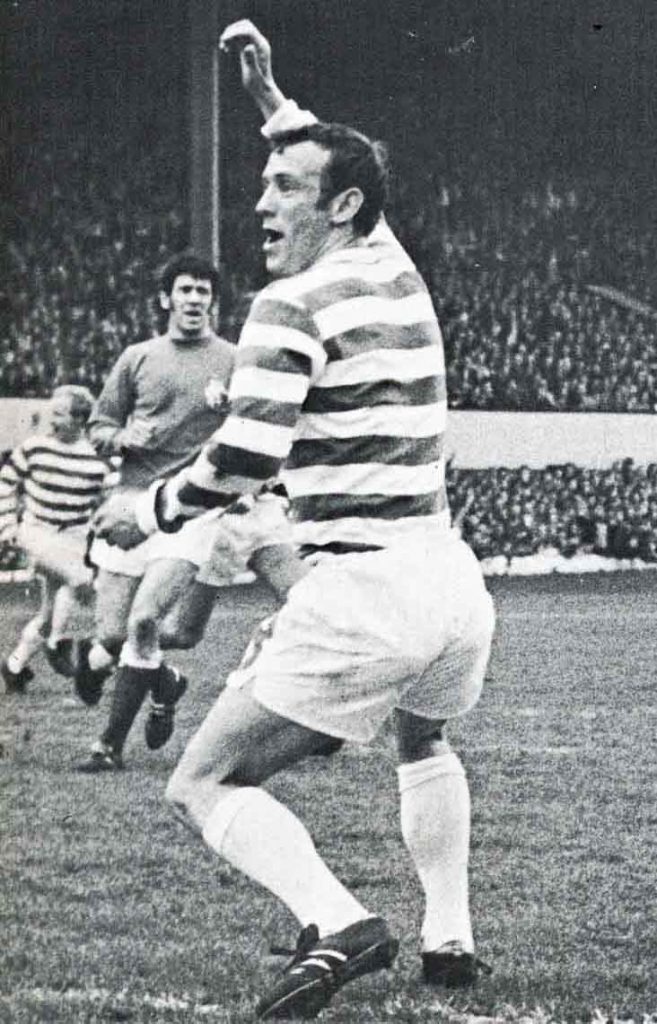
CHEERS…Bobby Lennox celebrates another goal against Rangers. John Greig doesn’t share his joy.
Before that, though, was the first Old Firm league confrontation of the new season and, after two victories already over the old enemy, Celtic went into the game reasonably confident in front of their own fans on 14 September. Lennox contrived to have what looked like two legitimate goals ruled out as the Ibrox men triumphed 4-2. Wallace scored two which meant he had netted all Celtic’s five goals in their three games against Rangers.
‘That was a strange game,’ recalled Gemmell. ‘You would look at the scoreline and see that a team had scored four goals against us at Parkhead – when did that last happen? – and you would have been forgiven for believing they had massacred us. Honestly, that was not the case. To be fair, Rangers did play well that day and they put in a lot of effort, but it was one of those occasions when you realise there is no way back only when you hear the referee’s final whistle. Right up to that moment you believe you can achieve something. We were making chances and I had a few long-range efforts myself that were blocked with the keeper all over the place. I remember both Bobby Murdoch and Bertie Auld weren’t playing and who wouldn’t miss their presence in the middle of the park? No excuses, though. We had lost to them in the second game of the previous season and had still gone on to win the title. We would just have to go on another thirty-two game unbeaten run!’
A week later Celtic were held to a 1-1 draw with Dunfermline at East End Park where Johnstone scored. A point dropped? Or a point gained? This set of Celtic players were only ever satisfied with victory, but on the coach home from Fife the feeling was that it was important not to lose a second successive league match against very dangerous opponents, still on a high after their Scottish Cup victory and with their vociferous manager George Farm claiming they would build on that success. His priority, he promised Dunfermline fans, for the new season was the league championship.

The midweek League Cup return against Hamilton saw the influx of youngsters Stein believed would usher in a bright new era for the club. He mixed in experienced campaigners Jim Craig, John Clark, Joe McBride and Charlie Gallagher to give them a helping hand. They didn’t require it. Two goals from McBride and a collector’s item from Clark allied to one from McMahon eased new-look Celtic to a 4-2 victory.
Davie Hay was pitched in for skipper Billy McNeill at centre-half that night. ‘So, no pressure right from the start, then,’ joked the likeable Hay. ‘Big Jock used to play individuals in all sorts of varied positions to give them an idea of what they should anticipate from players facing them. For instance, he put me in as a centre-forward for a few games in the reserves. I had never played there in my life, but it was merely to give me the experience of coping with someone defending against me. What would I have done in his situation? Would I look to make space, right or left? Would I come off the defender or would I stick with him? All that sort of stuff. It was invaluable and undoubtedly it helped when you were up against someone in a position where you had gained some sort of experience. You had some sort of idea of how they might be thinking.
‘Big Jock knew my preference would be full-back, probably right, but he wanted to further my football education against Hamilton. It didn’t do me any harm. Myself and the other young guys went into that game without any pressure on us whatsoever and that was another of Big Jock’s great secrets. He would pick and choose the games very carefully before he introduced you. He would even look at a string of forthcoming matches and wonder if it was worth the chance giving you an extended run in the team as opposed to popping in every now and again. He was a great schemer and was years ahead of anyone else.’

EMERGING BHOY…Davie Hay who was beginning to make an impact at the Hoops.
Whereas Hay, Connelly, Macari and Dalglish went on to have excellent Celtic careers, Bobby Wraith joined the list of one-game goalkeepers in the sixties. Wraith, who had caught the eye of Stein while playing for Largs Thistle in a bounce game against a young Celtic side, took his place alongside Willie Goldie, Dick Madden and Jack Kennedy as now-you-see-me-now-you-don’t custodians during that decade of change. ‘My God, even I played more than one game in goal for Celtic,’ said Gemmell. ‘I replaced Ronnie Simpson on two occasions in 1969 and didn’t concede a goal. The first was in a scoreless Scottish Cup-tie against Clyde at Shawfield and the next was a League Cup semi-final against Ayr United which we won 2-1. Ronnie, of course, had been troubled with a shoulder injury and had, in fact, been appointed captain for a game against Airdrie only a few days before the Ayr match to celebrate his thirty-ninth birthday. Nine months later this very special guy had to retire. What a career, though!’
After their fourteen-goal two-game blitz on Hamilton, Celtic toiled in the semi-final against Clyde. All the big guns, Lennox, Wallace, Chalmers, McBride and Hughes, were on display, but it took a solitary first-time strike from substitute Connelly to book a place in the final against Hibs. The month of October also saw the team scrape a 2-1 home victory over St.Johnstone – goals from Lennox and McNeill – and a dropped point in a 1-1 tussle with Morton at Cappielow where McBride netted his last goal for the club.
Rangers had failed to take advantage of Celtic’s slip in Greenock after losing 3-2 to Aberdeen at Ibrox, the mirror image of their only defeat in the league the previous season. Rangers immediately invested £100,000 in Hibs’ all-action frontman Colin Stein and, a month later, they paid St.Johnstone £50,000 for combative midfielder Alex MacDonald. That took their spending to only £50,000 short of half-a-million pounds in just over two years, a breathtaking amount of money in the sixties.
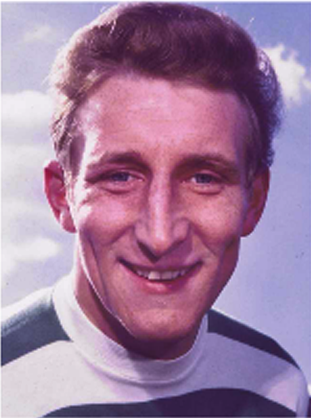
THE BIG SHOT…Tommy Gemmell, Celtic’s flamboyant goalscoring full-back.
The European Cup campaign had kicked off in France in September and once again Celtic got an early jolt. ‘We had originally been drawn against Hungary’s Ferencvaros,’ recalled Gemmell, ‘but because of all the unrest and turmoil in Eastern Europe at the time, Bob Kelly protested to UEFA and, remarkably, they had another ballot and this time we were paired with French side St.Etienne. We might have been better off with Ferencvaros! We had been warned that St.Etienne had this big African named Salif Kieta playing as their main striker. He had been scoring goals galore and great things were expected of him.
‘Sure enough, he lived up to his star billing. He made Big Billy’s life a misery that night. Kieta was a powerful giant of a man who had this incredible long stride. When he got going, he took some stopping. He scored two goals as they won 2-0 and, to be honest, his performance in the first leg was as good as anything I had witnessed by an opponent against our skipper in all my time at the club. Yes, he was that good.’
At Parkhead, 75,000 turned out see at first hand the phenomenon that was Kieta while hoping their favourites could reverse the tie. It was another wonderful European night in Paradise. It was scoreless right up to just moments before the half-time whistle. Celtic had played reasonably okay, but the French were well drilled and, of course, they presented the ball to Kieta at every opportunity and a hush would descend upon Parkhead when he took off on that mesmerising stride of his.

Billy McNeill wasn’t about to be bullied on this occasion, though, and the Celtic captain’s timing in the tackle was crisp and accurate. Jock Stein was heading up the tunnel, already preparing his half-time pep talk, when defender Henri Camerini hauled down McBride in the box. Penalty!
Gemmell takes up the story. ‘I knew it was a crucial award and I also realised a goal at that stage would, in all probability, turn the game on its head. I had to score. The French went through the usual routine of trying to unsettle me. They were uttering all sorts of oaths and, of course, when I stepped up to take the kick there were the mandatory clods of earth and all sorts of stuff being chucked in front of me. They were wasting their time. I hit that ball as well as I have hit any and it zoomed into the roof of the net. We were back in the game.’
Full-back partner Jim Craig took his lead from his big mate in the second period when he galloped onto a neat pass from Johnstone and thumped a low effort beyond Andre Carnus, in the St.Etienne goal, for the equaliser; his only European Cup goal for the club. The volume was pumped up a notch and Johnstone ran the French defence ragged with another invigorating performance of invention and incisiveness. Chalmers turned in a third and McBride made it 4-0 just before the end. Kieta trooped off, a dejected and defeated figure at the final whistle. Celtic players, in stark contrast, whooped it up.
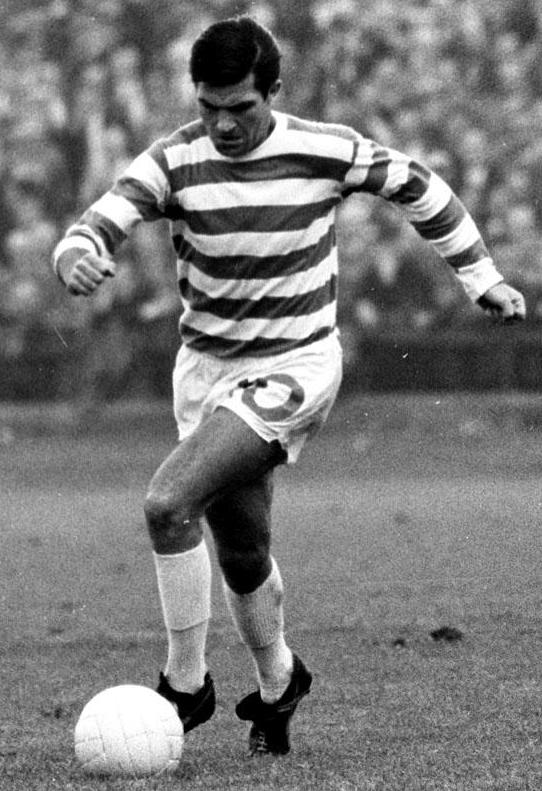
ON THE BALL…Bertie Auld and that educated left foot.
Celtic were obliged to squeeze five league fixtures and two European games into the month of November. ‘It was just as well we were an exceptionally fit team,’ said Bertie Auld. ‘There were no slackers in training at Celtic which was very important when you saw the fixtures stacking up. Big Jock liked to keep us fresh, of course, but he rarely tinkered with his defence so that meant guys such as Jim Craig, Billy McNeill, John Clark and Tommy Gemmell were in week in, week out. Up front, Jock would change things around almost on a weekly basis. Sometimes he would bring in John Hughes from the wing and play him right in the middle of the attack, then he would play Stevie Chalmers a bit wider on the right. It kept us ticking over.’
Stein also entered the transfer market to spend £35,000 on left-sided midfielder Tommy Callaghan, a player he knew well from their time together at Dunfermline. Callaghan thrived on hard work and would go deep to take the ball off the defence and, with a marvellous loping stride that ate up the ground below him, would carry the ball deep into the other team’s half.
Quietly and effectively, Stein was changing things in Celtic’s style of play. In the past, he had relied on the likes of Auld, Murdoch and Gallagher to hit telling, long-range passes from their own half. That was not Callaghan’s forte. He was a runner and Celtic fans got their first glimpse of him in an emphatic 4-0 victory over Partick Thistle. Callaghan couldn’t have wished for a better debut and even scored with Hughes (2) and Lennox netting the others against former Rangers goalkeeper Billy Ritchie, who would never have nominated Parkhead as one of his favourite places to ply his trade.

The domestic scene for November was completed with another of those spectacular, sparkling clashes against Hibs at Easter Road. These games were becoming high-scoring classics and on this occasion Celtic triumphed 5-2. It was interesting to look across Glasgow to see how Scotland’s first six-figure man was faring at Rangers. Stein had started like a whirlwind that appeared to blow itself out after three hours. He notched a hat-trick against Arbroath and followed that up with another threesome against his old club Hibs. However, St.Mirren, with future Celtic keeper Denis Connaghan in fine form, stopped Stein and Rangers in their tracks with a surprise 1-0 win at shroud-covered Love Street. Rangers had now lost three times as many league games as they had done the previous season.
Alarmingly, Celtic were forced to share the points in three out of their four league games in December. The month began as expected with a 5-0 triumph over St.Mirren in Glasgow. There was a hiccup in a goalless draw at Falkirk and it took a Chalmers goal to give Stein’s side a 1-1 draw with Kilmarnock. There was another scoreless stalemate at Airdrie to bring 1968 to a halt. The forward line that had provided nineteen goals in five games in November had produced only one in three matches in the run up to the year. However, if goals were in short supply in the league, that certainly wasn’t the case in Europe, courtesy of a small, flame-haired gentleman called Jimmy Johnstone. The much-vaunted Red Star Belgrade were routed 5-1 in Glasgow after what was surely the most bizarre deal ever struck between Stein and a player.
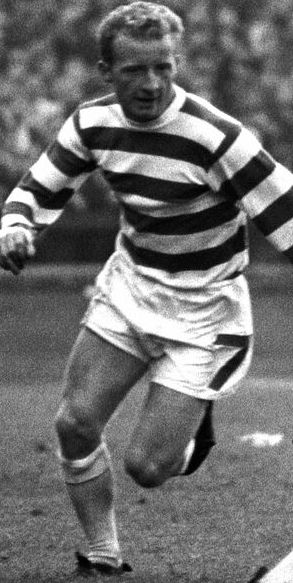
WEE JINKY…Celtic’s wing wizard Jimmy Johnstone.
‘It was well-known that the Wee Man was terrified of flying,’ said Gemmell. ‘I used to joke with him. “Jinky, you think you’ve got a problem? I don’t even like being this tall!” Actually, he had a real scare when he was coming back from our tour of The States in 1966. He and Ian Young, our right-back, were allowed home early because they had already set wedding dates. The plane hit an air pocket and, according to Jinky, “dropped like a stone for miles”. That’s the way he remembered it, anyway! But the experience did leave him with an unshakeable fear of flying. As I recall, we were drawing 1-1 with Red Star at half-time at Parkhead. Bobby Murdoch gave us the lead, but a bloke called Jovan Acimovic equalised. We all knew Big Jock was brilliant at mind games and psychology.
‘He pulled Jinky aside in the dressing room and said, “Get us a four-goal advantage and you won’t need to fly to Belgrade.” Jinky face lit up. “Dae ye really mean it, Boss?” he asked. Big Jock assured him he would keep his end of the bargain if Jinky produced the goods. The Wee Man played like a man possessed after the interval. Red Star must have wondered what on earth had happened in our dressing room at half-time. Jinky always gave his best, of course, but he was transformed that evening. He ripped their defence to shreds. There was nothing they could do as he kept coming at them and carving them open. He was racing all over the pitch shouting at his team-mates, “Gie me the ba'”. It was a truly memorable performance from my wee pal.’
Johnstone started the fightback with a goal two minutes after the turnaround. Then he set up Lennox for the third before providing Wallace with the fourth. So, four down and one to go. He notched the all-important fifth himself as he snaked in from the right, bamboozled a couple of defenders and then slid a right-foot shot low into the far corner. Jim Craig recalled, ‘Jinky was running away shouting “Ah don’t have tae go! Ah don’t have tae go!” Any English-speaking Yugoslav opponent must have wondered what on earth he was going on about. We all knew, though. He had delivered big-style.’
Gemmell added, ‘They got a corner-kick in the last minute and Jinky was back telling us, “Noo don’t youse dare let them score.” The kick came over and guess who cleared? Wee Jinky! I don’t think I had ever seen him in our penalty box before at a corner-kick.’ A crashing twenty-yard drive from Wallace gave Celtic a 1-1 draw in Belgrade and Europe was once again sitting up and taking notice of the 1967 champions.

* TOMORROW: Don’t miss ‘TROUBLE IN PARADISE’, another dramatic instalment from Alex Gordon’s book, ‘CELTIC: The Awakening’ – only in your champion CQN.

